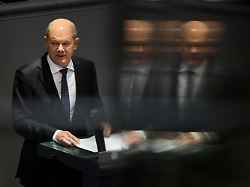It has been almost eight months since Russia invaded Ukraine. In his first government statement in four months, Chancellor Scholz names five stress tests. He lists what the traffic light coalition has already done. He ignores problems.
For weeks, the opposition had asked Chancellor Olaf Scholz to explain his policies in the Bundestag – now he made his third government statement since the Russian invasion of Ukraine. The situation is not exactly easy: his traffic light coalition has been battered after the fierce dispute over extending the lifespan of nuclear power plants, it is at odds over the supply of weapons and it is still not clear exactly how the federal government intends to help households and companies with the price of gas. The Economics Ministry has just corrected its economic forecast downwards. A recession is now expected for the coming year. Companies are taking cover, private individuals are crawling under the covers in cold apartments. Is there a wave of bankruptcies?
Scholz tried to spread optimism this morning. The tone was self-confident: “Putin believed he could divide us Europeans. But he achieved the opposite,” he said. Or: “Putin hoped to be able to blackmail us by turning off the gas tap. But he miscalculated there too. Because Europe stands together.” And further: “Together we will probably get through this winter.” He praised the fact that the gas storage at the beginning of winter was currently 96 percent as a “great achievement”. However, experts emphasize that full gas storage facilities are no guarantee that there will be enough gas for the entire winter.
Scholz had nothing new to announce. The speech was like taking stock of the measures taken so far – and what he presented as successes. As expected, he received criticism from the opposition. Union faction leader Friedrich Merz reproached him with the fact that Germany was not supplying any western-style battle tanks – a demand that was also supported by the FDP and the Greens. Merz also attacked Scholz’ for his tendency to claim that he always knew everything beforehand. If Scholz was already sure by the end of 2021 that Putin would attack, Merz asked the Chancellor why was he still sticking to Nord Stream 2?
“We are not weak”
CSU regional group head Alexander Dobrindt called for the nuclear power plants to be allowed to run longer and for new fuel rods to be ordered – exactly the issue that the chancellor had settled with a word of power on Monday. As expected, Scholz did not address the quarrels within the government and preferred to focus on the big picture. He stylized the situation as a fight “We against Putin” and tried to demonstrate strength in short sentences and simple words. “He (Putin) speculates on our weakness. But he is wrong. We are not weak.”
At the same time, Ukraine and its allies in the West now have a certain amount of momentum behind them. Thanks to arms deliveries, Ukraine is retaking territory and has taken the initiative on the battlefield. Even Russian propaganda now grudgingly admits that there are problems. The unity of the EU, the alliance with the Americans and even the country’s own energy supply have held up so far. Putin turned off gas to Germany, which caused the price to skyrocket – but Norway and now France, for the first time ever, stepped in. Gas prices have fallen again.
Nevertheless, the unity of Europeans is fragile. The Franco-German government consultations, which are a symbol of close ties, have just been canceled. Now the ratio is at rock bottom. Many Europeans are annoyed by the German energy price defense umbrella. Several countries find that the “double boom” is 200 billion euros too much. According to the lawsuit, Germany is gaining an advantage here while the economy is going down the drain elsewhere. Scholz addressed this in his speech and emphasized that the sum would also extend to two and a half years. This explanation, which Scholz tried not for the first time, faded away in Paris. French President Emmanuel Macron said in the afternoon that it would not be good for Europe if Germany isolated itself.
Germany is not leading the way when it comes to arms deliveries
But there are further reservations in the EU – the fact that Germany is fundamentally sticking to the nuclear phase-out is likely to disappoint many. Especially since everyone now has to save energy together, because Germany has prospered for years and decades thanks to Russian gas and is now collecting the bill for it. Then there is Hungary’s President Viktor Orban, who openly sympathizes with Putin and the dispute over the exchange of rings with Poland.
Scholz spoke of five tests: the war in Ukraine, the threat of famine, energy as a weapon, inflation and the expansion of renewable energies. He referred to the company’s own arms deliveries, whereby it was not mentioned that the decisive aid comes from the USA and that Germany is not making any progress within Europe either – the country is in 3rd place, but only 16th in terms of its economic power. He committed himself to the climate goals, although coal-fired power plants are going back on line. It used to take seven years to build a wind power plant. Scholz promised that by the end of the year all the rules would be in place to push the expansion forward.
Scholz sounded most optimistic at the end of his speech. Putin has “actually” already failed with his war course, he said. The Ukraine, Germany and Europe would emerge stronger from these tests – “more united and more independent than before,” the Chancellor promised. Scholz did not mention that the decisive phase of the test, the upcoming winter, has not even begun.
